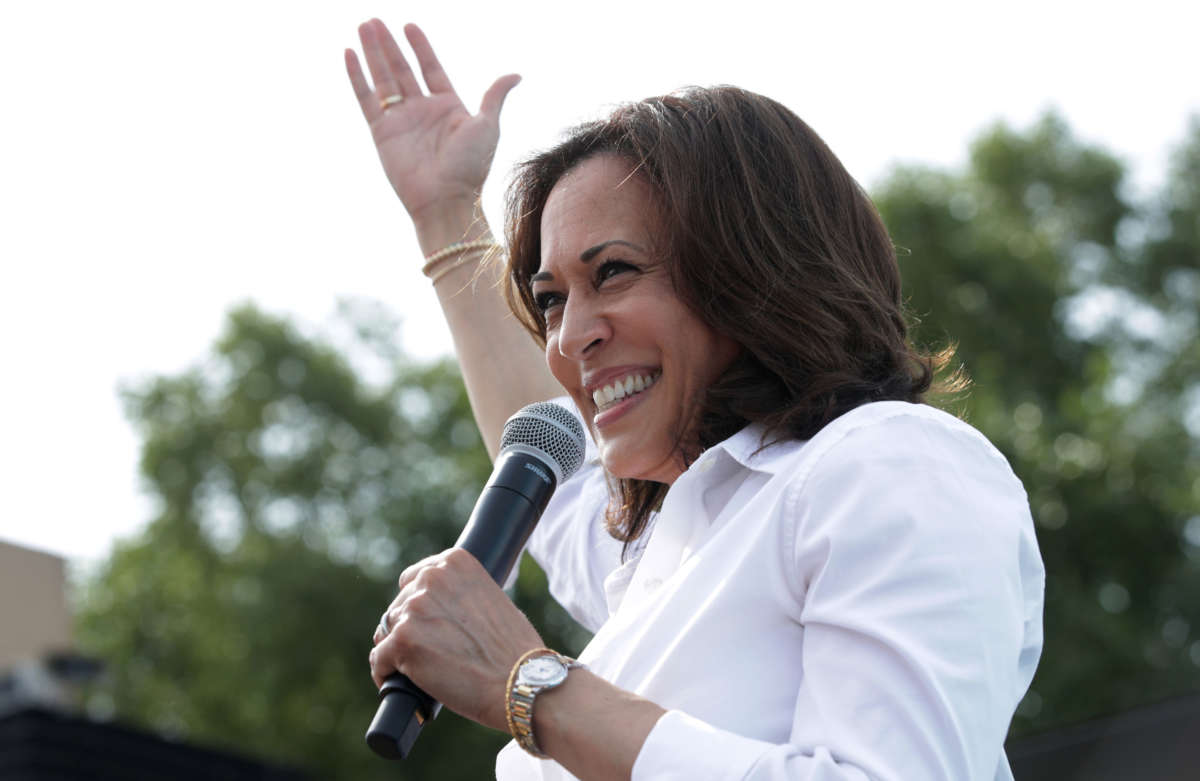Support justice-driven, accurate and transparent news — make a quick donation to Truthout today!
Presumptive Democratic nominee for president Joe Biden has selected Sen. Kamala Harris of California as his vice-presidential running mate.
Harris, who herself ran for president in the Democratic primary races against Biden earlier this year, is just the fourth woman to be named to the ticket of a major political party in presidential politics and the third woman to be named a vice-presidential candidate.
While many on social media described Harris as an inspiring choice, others noted that her progressive bona fides were lacking. Indeed, there have been many instances in Harris’s past that demonstrate she had a so-called “tough on crime” approach, including overlooking alarming and illegal procedural transgressions among prosecutors under her purview as Attorney General of the state of California.
In one specific instance, a prosecutor in California had “deliberately altered an interrogation transcript to include a confession that could be used to justify charges carrying a life sentence,” according to a trial court examining the details of the case. Rather than attempt to rectify the situation, Harris sought to defend the prosecutorial misconduct, arguing that the case in question should be upheld because the problematic actions weren’t “physically brutal” and thus didn’t fit the “shock the conscience” standard being sought by defendants for dismissal.
Back when Harris was a candidate for president, University of San Francisco School of Law Professor Lara Bazelon had some telling words to say about her past as well. Writing in the New York Times, Bazelon said that “Harris fought tooth and nail to uphold wrongful convictions that had been secured through official misconduct that included evidence tampering, false testimony and the suppression of crucial information by prosecutors.”
Indeed, a number of progressives on social media spoke out against Harris being named Biden’s vice president choice immediately after it was announced. In her first race for office, noted The Intercept’s Lee Fang, “Kamala Harris campaigned as tough on crime — and unseated the country’s most progressive prosecutor” by doing so.
“The only democrats who are excited about Kamala Harris being Joe Biden’s pick are the ones on CNN, MSNBC and Twitter,” added author Tim Young.
Benjamin Schneider, writing on Tuesday for SF Weekly about Harris, also noted her past prosecutorial experience, including her aversion to supporting progressive overhauls to the justice system.
The vice presidential nominee often took stances that went against what she campaigned on. “Harris has always personally opposed capital punishment, calling her stance ‘non-negotiable,'” Schneider wrote. “But in 2014, when a District Court judge in Orange County ruled that the death penalty was unconstitutional, Harris asked the 9th Circuit Court of Appeals to overturn the ruling, arguing that her duty to uphold state law trumped her personal beliefs.”
That may seem a noble trait to some, being able to put aside personal beliefs to serve out the functions of her office, but it’s inconsistent with what she did on other issues. When California voters decided to end the ban on gay marriage through Prop 8, Harris suggested the voter initiative was unconstitutional, and “chose not to enforce” it, Schneider recounted.
The Guardian’s Derecka Purnell also offered her take on Harris being named to the Democratic Party’s presidential ticket, suggesting that the vice-presidential candidate may offer hope for some until they more closely examine her past record:
Women of color, particularly progressives, might feel torn. Perhaps even closeted excitement. Senator Harris is sharp, strategic, and witty, undoubtedly qualified to be vice president of the United States. She graduated from a historically Black college and belongs to a prestigious Black sorority. A biracial woman with Jamaican and Indian heritage, we have seen her break color barriers and shatter glass ceilings, even though poor, Black women have felt and swept the falling shards. Thousands celebrated her Senate seat win and even more were captivated when she picked apart presidential candidates at debates – especially Biden. Her one-liners were unforgettable. Until we remembered that she honed those argumentative skills in court as a prosecutor, including during fights to uphold wrongful convictions … Together, they will promise expensive “common sense” police reform to a movement against senseless police spending
In short, Harris is not the progressive candidate that many in the Democratic Party make her out to be, and that could be detrimental to the ticket for two reasons. First, it won’t appeal to an electorate that is clamoring for a progressive ticket from the Democratic Party. Second, because Harris is decidedly more to the left than President Donald Trump and his supporters, she will face a number of attacks from the right as being part of the so-called “radical left” — a moniker his campaign pushed to describe her just minutes after she was announced the vice-presidential candidate.
Having to defend against both sides — trying to play up her progressive credentials while also trying to downplay them to a broader electorate — may prove difficult for her to do in the general election campaign.
Media that fights fascism
Truthout is funded almost entirely by readers — that’s why we can speak truth to power and cut against the mainstream narrative. But independent journalists at Truthout face mounting political repression under Trump.
We rely on your support to survive McCarthyist censorship. Please make a tax-deductible one-time or monthly donation.
